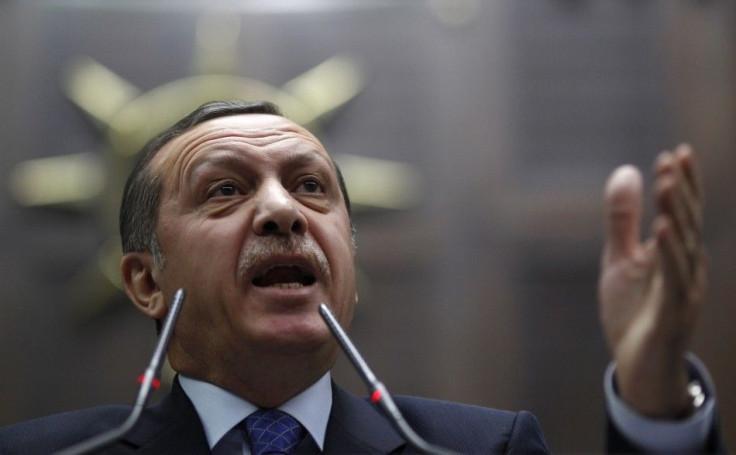Turkey's Misguided Foreign Policy
Opinion

A century ago, President Theodore Roosevelt's "speak softly and carry a big stick" foreign policy enhanced American power and prestige around the world. Today, Turkish Prime Minister Recep Erdogan imperils his country's chances of regional preponderance by pursuing a policy of speak pugnaciously and carry no stick.
In the last three years, Ankara has engineered diplomatic conflicts with Israel, Cyprus and her Greek patron, and most recently Syria. And, Turkey has warned each country that their disputes might culminate in a military confrontation. Nevertheless, none of the threatened countries have altered their behavior, even cosmetically, to mollify Turkey, thereby calling Ankara's credibility into question.
When Erdogan's Justice and Development Party (AKP) assumed power in 2002, it sought to bolster Turkey's international influence through a "zero problems with neighbors" foreign policy, which entailed resolving outstanding disputes with all surrounding countries and increasing Turkish security and economic cooperation with all of its neighbors, especially the Arab world and Iran. To this end, in 2004, Erdogan became the first Turkish Prime Minister in fifty years to visit Greece, Turkey's traditional rival. Then in July 2005, Erdogan and Greek Prime Minister Kostas Karamanlis laid the foundation of a pipeline to transport Azerbaijani natural gas to Europe. Turkey also sought increased security cooperation with Greece, with the two countries agreeing in 2007 to create a joint Operational Unit within the framework of NATO with the aim of participating in Peace Support Operations along with a joint Disaster Relief/Humanitarian Aid Task Force.
Erdogan also attempted to maintain simultaneous working relations with Hamas, Israel, and Syria. After Hamas won the 2006 Palestinian legislative election, Ankara invited Khaled Mashal, chairman of Hamas's politburo, to Turkey despite Israeli protests. Yet, from May to December 2008, Israel trusted Turkey to mediate peace negotiations between Jerusalem and Damascus. The greatest turnaround was in Turkish-Syrian relations. On the brink of war in 1998 over Syrian sponsorship of the Kurdish PKK terrorist group, by 2009 the countries had lifted mutual visa requirements, established the Syrian-Turkish High Cooperation Council to enhance economic and military cooperation, and held large-scale joint military exercises.
In 2009, however, an increasingly confident Turkey traded its good neighbor policy for an aggressive neo-ottoman one. First, Erdogan contrived to reinvent himself as the champion of the Palestinian cause after Israel launched Operation Cast Lead in December 2008 to halt rocket attacks from Gaza. Erdogan has since hailed Hamas militants as "freedom fighters struggling to protect their land." And, perhaps reasoning that Israel would never board a Turkish-owned ship, the AKP government offered logistical support to the Mavi Marmara, a vessel participating in a 2010 flotilla aiming to break the Israeli blockade of Hamas-controlled Gaza, to establish Turkey as the one Muslim country that can command Israeli compliance. Israel demanded to inspect the cargo for contraband and promised to deliver the humanitarian aid to Gaza. When the flotilla refused, Jerusalem called Turkey's bluff and Israeli forces raided the ship and killed nine Turkish activists who violently resisted. A humiliated Erdogan threatened to send Turkish warships to break the blockade and urged the international community to impose sanctions on Israel. However, Turkey never made good on its threat and a UN investigative committee confirmed the blockade's legality, further eroding Turkey's prestige.
Soon after, Ankara threatened to dispatch warships to Cypriot waters to dissuade Nicosia from unilaterally exploring for natural gas and developing the fields recently discovered off her southern coast. In 2010, Cyprus and Israel signed a maritime border delimitation agreement. But, Turkey has rejected the agreement, since Ankara does not recognize Cyprus and insists that Nicosia include authorities from Northern Cyprus (which it supports) in the making of all gas-related policy, even concerning gas fields that do not border the north. When Nicosia ignored Ankara's threats, Turkey conducted live fire naval exercises near the disputed natural gas fields. But Turkey's belligerence has had the opposite of its intended effect, prompting increased military cooperation among Israel, Cyprus, and her Greek patron, including joint naval exercises and a Greek-Israeli security pact. So far, Turkey's ultimatum to Cyprus has fallen on deaf ears.
Finally, Erdogan has abandoned Turkey's newfound alliance with Damascus in the wake of the Syrian Uprising, calling on Assad to resign and hosting in Turkey the Syrian National Council and members of the Free Syrian Army. Yet, Turkey looks increasingly impotent as its threats of military intervention lose their credibility. In March 2012, Erdogan proclaimed that Turkey might establish a buffer zone in Syria to protect refugees if Assad continued to suppress the uprising. Erdogan's threat proved empty. And when Syrian forces shot down a Turkish F-4 Phantom jet in June and Erdogan threatened Syria not to risk Turkey's wrath, the threat sounded equally hollow.
So, if Erdogan wants Turkey to achieve regional influence commensurate with its size (75 million) and economy (16th largest in the world), and do so without using force, he must reign in his bluster. That is not to say that Ankara should never express moral outrage. Jarring images of massacred Syrian civilians have genuinely disturbed Turkish leaders. However, repeated empty threats of military intervention undermine Turkish diplomatic influence over Damascus without scaring Assad into changing course.
Roosevelt's axiom remains the operative one: Ankara should threaten sparingly -- but back up its words with concrete action when it does. Erdogan would do well to take note of it.
Micah Levinson is a Junior Fellow at the American Foreign Policy Council in Washington, DC.
© Copyright IBTimes 2024. All rights reserved.





















